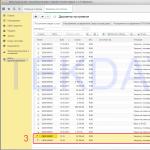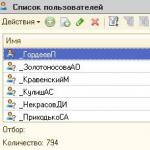To the question: is there cell phone service in Tunisia? given by the author Igor Petrov the best answer is Yes, of course.
If you have Beeline, then international roaming It will turn on automatically with any positive balance: you don’t need to write any statements about connection, just turn the phone on and off.
Companies providing communications in Tunisia for Beeline subscribers TUNISIANA, TUNTEL.
Reply from 2 answers[guru]
Hello! Here is a selection of topics with answers to your question: is there cellular communication in Tunisia?
Reply from User deleted[guru]
Communications and communication in Tunisia
Profitable mobile communications around the world!
Incoming calls are free! Outgoing calls from 14 rub. /min.
The country is divided into 8 telephone zones, each of which is designated by its corresponding area code. To make a call within the zone, just dial the subscriber's number. To call another area within Tunisia, you need to add 0 to the area code. telephone communication(“taxiphon”) are located almost everywhere. International call centers are indicated by the sign “Taxiphon Internationale” (open from 8.00 to 22.00), and payphones are painted blue and operate from coins of 1 TND for international calls, and 0.5 TND and 100 millimes for domestic calls. Money can be exchanged right there at the negotiation point. The paid amount is displayed on the payphone display and automatically decreases as the conversation progresses.
A call to Russia from a payphone will cost about 1 TND per minute, a call from any hotel will cost 3 times more.
When calling to Tunisia, you must dial 8 - dial tone - 10 - 216 - area code (without zero) - number of the called subscriber. Some city codes: Tunis (capital), Meghrin, Ez-Zahra - 1; Bizerta, Zagwan, Zariba, Kelibia, Nabeul, Hammamet, Habeul, El Fahs - 2; Mahdia, Sousse, Monastir, El Jem - 3; Sfax area - 4; Gabes, Djerba, Kebili, Medenine, Tatawin, El Hamma - 5; Gafsa, Tauzar, Nefta, Sidi Bou Said - 6; Kairouan, Kasserine, Feriana - 7; Jenduba, Tabarka, Kef - 8.
Internet
GPRS roaming Russian operators No. There are Internet cafes in many cities across the country.
Cellular connection
Mobile communications covers almost the entire territory of the country and provides fairly reliable communications even with remote areas. Communication standard is GSM 900. Roaming is available to subscribers of major Russian operators. As in most other countries, roaming services are not cheap. Incoming calls for Skylink and MTS subscribers are extremely expensive - more than 80 rubles per minute. Megafon and Beeline are much cheaper - 20 rubles and 39 rubles, respectively. Outgoing calls are much cheaper for all operators - 25-29 rubles each for MTS, Beeline and Skylink and only 19 rubles for Megafon. Thus, we can conclude that Skylink and MTS have set such incoming prices that talking on mobile phone became too expensive. Beeline has inexpensive SMS messages and good prices for outgoing calls, while Megafon has the opposite - the strength of the tariff is local calls and incoming calls.
Buying a local SIM card will cost $20-25, so if you do not plan to make a large number of calls abroad, then it is better to stay on roaming. On the other hand, the tariffs of local operators are quite cheap. Both major operators, Tunisiana and Tunisie Telecom, offer similar rates for calls to Russia - 12 rubles per minute and 4 rubles per SMS message. All incoming calls are free.
Reply from Mobich Mobich[active]
Of course there is! You can use roaming from Russian telecom operators, or you can get a tourist SIM card, but communication is still relatively expensive. Here are the prices for calls:
Of the Russian operators, MTS with the Eurasia service may be suitable. 39 rubles - the first minute and 9 rubles for the rest.
In Tunisia, a former colony, there is still a strong French influence - not only in the language, but also in the cellular communications segment. The French Orange has controlled a significant part of the market since 2010, the second place in terms of audience coverage is Tunisie Telecom, the third is Ooredoo, a Qatari company with many representative offices in Islamic countries.
All companies are powerful business structures with their own equipment. There are no so-called “tenants” in the country, that is, companies using the power of the leaders. Because of this, cellular tariffs in the country, although one of the best in Africa, are still inferior in cost compared to, say, Egypt.
The connection quality is good. The only place where there may be problems is the Sahara Desert.
Where is the best place to buy a SIM card?
If you're lucky, you can get a package from Orange (albeit at a rate that's not very favorable for tourists) completely free - the company organizes similar promotions at airports. Otherwise, you can purchase a SIM card from local operators at any authorized outlets, communication shops and large stores.
Also note that operator sales points are located at almost every hotel. It's very convenient, although the prices are a little high. The standard cost of SIM cards is from 3 to 5 dinars, but special travel packages cost about twice as much.
By the way, you can also use the Internet order for SIM cards from any of the local operators: the package will be delivered directly to your hotel room upon your arrival.
Cellular tariffs for tourists
Tunisian operators offer several tariffs for tourists, among which you can choose good options. For example, an offer from Tunisie Telecom: for 10 euros you immediately receive 10 dinars to your account and preferential rates for calls to Russia (0.15 euros per minute - 0.55 Tunisian dinars, or about 12-14 rubles).
It is also worth paying attention to the tourist tariff from Ooredoo: 0.54 dinars per minute of communication with subscribers in Russia, and if necessary, you can call within Tunisia for only 0.2 dinars per minute. As usual, we suggest comparing with roaming prices of Russian operators, where the cheapest rates start from 60 rubles/min.

How to call Tunisia from Russia
To call, use the Tunisian international prefix - 216.
To mobile phone
We use a phone number with the prefix 216 instead of “eight”.
- For example: +216-000-000-00-00.
To a landline phone
For reference - telephone codes popular resorts:
- Tunisia - the capital of the country of the same name: 71;
- Hammamet - 72;
- Sus - 73;
- Djerba - 75.
The call is made as follows: “intercity access” - beep “exit to international calls" - "country prefix" - "city prefix" - "telephone number". The dialed number to call the capital will look like this:
- 8-beep-10-216-71-1234567.

How to call Russia from Tunisia
You can call Russia not only from a mobile phone, but also either from a landline phone in a hotel (very expensive, about 5 dinars per minute) or from a city payphone. To use the latter, buy a card at any post office or newsstand. The dialing algorithm is the same as for regular landline phones.
To mobile phone
If you are in roaming, you do not need to take any action - just call the number in direct format using “8”. If the call is coming from a Tunisian SIM card, dial the Russian prefix code +7 and then the phone number without “8”.
To a landline phone
Access to the international line when calling from Tunisia is 00. Next is 7 (Russian prefix), the city code and, in fact, the phone number.
The country is divided into 8 telephone zones, each of which is designated by a corresponding area code. To make a call within the zone, just dial the subscriber's number. To call another area within Tunisia, you need to add 0 to the area code. Automatic telephone payphones ("taxiphon") are located almost everywhere. International call centers are indicated by the sign “Taxiphon Internationale” (open from 8.00 to 22.00), and payphones are painted blue and operate from coins of 1 TND for international calls, and 0.5 TND and 100 millimes for domestic calls. Money can be exchanged right there at the negotiation point. The paid amount is displayed on the payphone display and automatically decreases as the conversation progresses.
A call to Russia from a payphone will cost about 1 TND per minute, a call from any hotel will cost 3 times more.
When calling to Tunisia, you must dial 8 - dial tone - 10 - 216 - area code (without zero) - number of the called subscriber. Some city codes: Tunis (capital), Meghrin, Ez-Zahra - 1; Bizerta, Zagwan, Zariba, Kelibia, Nabeul, Hammamet, Habeul, El Fahs - 2; Mahdia, Sousse, Monastir, El Jem - 3; Sfax area - 4; Gabes, Djerba, Kebili, Medenine, Tatawin, El Hamma - 5; Gafsa, Tauzar, Nefta, Sidi Bou Said - 6; Kairouan, Kasserine, Feriana - 7; Jenduba, Tabarka, Kef - 8.
Internet
Russian operators do not have GPRS roaming. There are Internet cafes in many cities across the country. In addition, wi-fi is available in almost all hotels, from the most luxurious to simple city hotels. Another kind of problem is the fact that the Internet in Tunisia is quite slow and clearly insufficient for full-fledged online work.Cellular connection
Mobile communications cover almost the entire territory of the country and provide fairly reliable communications even with remote areas. Communication standard is GSM 900. Roaming is available to subscribers of major Russian operators. As in most other countries, roaming services are not cheap. Incoming calls for Skylink and MTS subscribers are extremely expensive - more than 80 rubles per minute. Megafon and Beeline are much cheaper - 20 rubles and 39 rubles, respectively. Outgoing calls are much cheaper for all operators - 25-29 rubles each for MTS, Beeline and Skylink and only 19 rubles for Megafon. Thus, we can conclude that Skylink and MTS have set incoming prices such that talking on a mobile phone has become too expensive. Beeline has inexpensive SMS messages and good prices for outgoing calls, while Megafon has the opposite - the strength of the tariff is local calls and incoming calls.
Buying a local SIM card will cost $20-25, so if you do not plan to make a large number of calls abroad, then it is better to stay on roaming. On the other hand, the tariffs of local operators are quite cheap. Both major operators, Tunisiana and Tunisie Telecom, offer similar rates for calls to Russia - 12 rubles per minute and 4 rubles per SMS message. All incoming calls are free.
SIM cards for tourists in Tunisia are very affordable. For just 10 dinars (3.5 euros) you will receive a card with 1 GB of Internet for a week.
But buying a local SIM card is not so easy. It’s best to take care of it at the airport, because there may not be a phone shop in your city, and walking around local neighborhoods looking for a SIM card is not a pleasant experience.
In 2019, domestic providers are “imposing” on tourists to use the limits of their plan when traveling abroad. But for holidays in Tunisian resorts, this roaming scheme only works in Megafon and MTS.
At the same time, the service paid daily upon calling or accessing the Internet through a Turkish mobile operator.
| Operator | Tariff “Like at home” (calls + internet) | ||
| from 329 rubles/day () | |||
 | from 450 rubles/day () | ||
| from 250 rubles/day () | |||
Plan Features:
- Megafon makes it possible to pay as you go for roaming services. Calls to Russia will cost 99 rubles. Internet 10 rubles per 1 MB.
- At MTS you can refuse the Internet and pay only for calls.
- Beeline gives 50MB of internet per day for 250 rubles + everything else on top
A week of active phone use in Tunisia will cost 3-5 thousand rubles.
SIM cards for tourists
Differences and characteristic features of tourist SIM cards:
- delivery of cards anywhere in the world leaves cards all over the world
- no monthly subscription fee
- pay only for used (prepaid) minutes and megabytes
- operate in almost all countries of the world
The largest mobile operators in Tunisia
The main mobile operators in the country are three companies:
- Ooredoo
A local SIM card is not too expensive, but to purchase it you will have to leave the hotel premises.
![]() The oldest mobile communications company is, on the market since 1996. The company was once a monopolist, but in 2002 another large operator appeared in the country - Tunisiana, which later changed its name to Ooredoo.
The oldest mobile communications company is, on the market since 1996. The company was once a monopolist, but in 2002 another large operator appeared in the country - Tunisiana, which later changed its name to Ooredoo.
 The last to enter the market was the local representative office of the French telecommunications company Orange S.A. The operator started operating in 2010.
The last to enter the market was the local representative office of the French telecommunications company Orange S.A. The operator started operating in 2010.
How and where to buy a SIM card
Local SIM cards are sold:
- in communication shops
- supermarkets
- airports
It is best to purchase a card upon arrival at the airport. Because there may not be any communication shops in resort towns. In addition, they are closed on weekends and holidays.
The cost of a tourist SIM card is 10 dinars (3.5 euros). The plan includes:
- 1 GB internet for 7 days
- 5 dinars in the account
- 50% discount on calls abroad (to Russia 0.15€/minute)
In addition, there is a gentle tariffication - receiving incoming calls from Russia can cost half as much as roaming.
To purchase a SIM card you must present your passport. Activation phone number may take a day. Don't forget to connect your Internet package immediately after activation. Most activation instructions are written in French and Arabic, less often in English.
Money is credited to a mobile account using cards for replenishing the balance, which are sold in all tourist areas of cities. These cards are usually called Recharge GSM and Cartes GSM.
Calling from a hotel room is three times more expensive than from a public pay phone. To communicate with home, it is more profitable to use payphones at international call centers with the inscription Taxiphones Internationales on the blue sign.
Payphones accept coins in denominations of 1 DT, half a dinar and 100 millimes. You can exchange dinars for small coins at the attendant. A call to Russia costs about $1 per minute. Intercity and city communication will cost much less.
During a conversation, keep an eye on the counter on the payphone screen and “feed” it with coins in advance. Payment starts from 15 seconds of communication, even if you were just hanging on the line, waiting for an answer. Payphone operating hours: 08:00-22:00
Mobile communications in Tunisia
For mobile communications, you can activate roaming, purchase a SIM card from a local operator, or use a special tourist SIM card. The most expensive option of the three is roaming.
Prices are indicated in rubles
Mobile communications in Tunisia are reliable, but not cheap. It operates according to the European 900 MHz GSM standard. There are two successfully competing in the country mobile operator: Tunisiana and Tuntel, and the cost of their services is almost the same. You can compare tariffs and purchase a SIM card at Taxiphones Internationales offices.
To apply, you only need money, a passport and a charming smile if you don’t know French. The Tunisiana card costs about $3. Calls to Russia cost about $0.30 per minute, local outgoing calls cost $0.15. An SMS will cost about $0.12.
Information about tourist maps can be found on the company websites: www.sim-travel.ru, www. travelsim.com, www. goodline.ru
Internet in Tunisia
The Internet in Tunisia is inaccessible and, at such speeds, quite expensive. Despite the fact that the nearest Internet cafe is probably not far from your hotel, the quality of the connection leaves much to be desired.
At best, you will be able to view your mail if the letters do not contain attachments. Other inconveniences include keyboards in French and restrictions on connecting your own laptop. In addition, the staff does not always understand how to set up the connection.
The network of the most popular Tunisian Internet cafes is called PubliNet and CafeNet. The cost of an hour of work on the Internet is about $2. Free WiFi almost impossible to find. Many hotels, restaurants and cafes have access to wireless internet will cost you almost $10 per hour.




